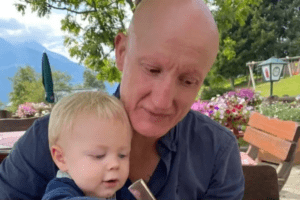Introduction
Three years ago, Tim Rees, a clinician from Germany, lost all his hair a second time to alopecia universalis (AU). As a registered clinical nutritionist, he felt he had lost his credibility to help others with autoimmune conditions, and when he expressed those feelings in a recent blog, it struck a chord with me.

Tim Rees with his son in 2022
“All my hair fell out, but it was my response to it that destroyed me. You could be forgiven for thinking this is all centered around vanity, but the thing that crushed me was that it made me feel like a fraud.” — Tim Rees, registered clinical nutritionist.
As a clinician, I felt similarly when I lost half my hair in September of 2022. I wondered if others would consider me a “failure” for not having been able to prevent it. What makes a clinician knowledgeable is their training and ongoing study, and I do not believe that a clinician diagnosed with an autoimmune disorder or metabolic disease is disqualified from being able to help others. On the contrary, provided they remain objective, a clinician’s ability to understand their clients’ struggles from “both sides of the desk” may be an asset.
Alopecia Universalis
Alopecia universalis (AU) is an advanced form of alopecia areata (AA), which is a condition that causes round patches of hair loss. In alopecia universalis, there is a complete loss of hair on the scalp and all over the body. It is an autoimmune condition in which the immune system mistakenly attacks the hair follicles [1].
[Image illustrating the difference between Alopecia Areata and Alopecia Universalis]
A Clinician’s Personal Story
Below is an excerpt of Tim’s story, shared with permission from his blog:
“Three years ago my hair started falling out for the second time. My immune system killed my hair follicles and the hair dropped away like oak leaves in autumn. Alopecia Universalis, not a single hair remained on or in my body.”
“The thing that crushed me was that it made me feel like a fraud. Alopecia, one of the most visible autoimmune diseases one can have, undermined my work and, I thought, my credibility as a nutritionist helping people with autoimmune conditions. But that’s not true. I’ve done amazing things with nutrition for myself and my clients.”
“This year will be different. I’m plastering this all over social media. Firstly, it’s a part of my acceptance. You must accept how things are today in order to make a difference tomorrow. Secondly, it’ll help to keep me motivated and compliant for however long it takes to allow my body to heal.”
The Path to Restoration
Tim plans to use an exclusion diet as well as nutritional supplements to support his recovery. He also intends to integrate other approaches including the use of sauna, cold thermogenesis, exercise, and circadian rhythm optimization. I applaud Tim’s boldness in stopping “hiding” and living his journey in a public way. I wish him the very best in achieving his goal.
Final Thoughts…
It is important to keep in mind that what may work for Tim may not work for others diagnosed with the same condition. I previously wrote two referenced articles related to nutrient supplementation and hair loss, Nutrients of Importance and Supplements with Evidence to Restore Hair Loss.
Since taking nutritional supplements is not without risk, I would encourage anyone considering this to first consult with a qualified healthcare professional to determine which nutrients may be low or deficient based on lab work.
To your good health!
Joy
You can follow me on:
Twitter: https://twitter.com/jyerdile
Facebook: https://www.facebook.com/BetterByDesignNutrition/
References
- National Institutes of Health (NIH). (2023). Alopecia Universalis. Genetic and Rare Diseases Information Center. [https://rarediseases.info.nih.gov/diseases/614/alopecia-universalis]

© 2025 BetterByDesign Nutrition Ltd.

